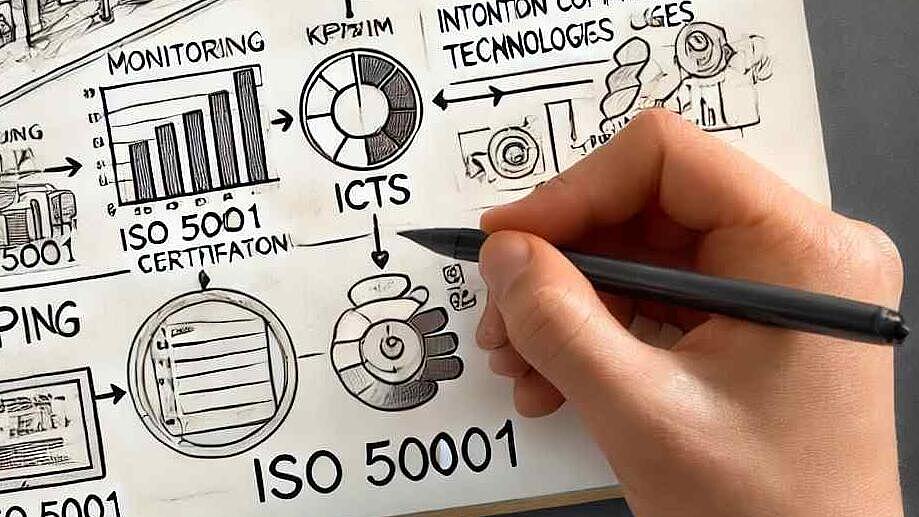 Energy Efficiency
Energy EfficiencyEnergy Efficiency in Food Manufacturing: Sustainable Growth Through Smart Technologies
Summary
This paper emphasizes the critical role of energy efficiency in the food production industry as it faces the challenges of climate change and resource scarcity. It underscores the need for food manufacturers to improve energy use due to the industry's large energy consumption. The paper discusses benchmarking and Key Performance Indicators (KPIs) as vital tools for tracking and improving energy usage in food processing. It explores the utility of frameworks and standards like ISO 50001 for systematic energy management and continuous improvement.
Advanced monitoring and control systems utilizing Industry 4.0 technologies such as smart meters and real-time data analytics are highlighted for their ability to optimize energy performance. Furthermore, the integration of Information and Communication Technologies (ICT) such as ERP systems and IIoT is examined for their potential to enhance energy efficiency across production chains.
The paper also addresses the challenges to implementing energy efficiency programs, including lack of awareness, resource limitations, and competing priorities. Strategies to overcome these barriers include fostering organizational buy-in, securing funding, and industry collaboration.
In conclusion, the paper posits that mastering energy management is crucial for the food industry's future competitiveness and sustainability, advocating for robust efficiency programs to meet emerging global food system demands.
Open full article
Energy Efficiency in Food Manufacturing: Sustainable Growth Through Smart Technologies
The Rising Importance of Energy Efficiency in Food Production
In an era of climate change and resource scarcity, the food industry faces mounting pressure to reduce its environmental footprint while meeting growing global demand. Energy efficiency has emerged as a critical factor for competitiveness, sustainability, and environmental performance. As one of the largest industrial energy consumers, food manufacturers must adapt and implement innovative measures to promote efficient energy use throughout their operations.
This chapter explores the increasing significance of energy management in food production and its potential to drive sustainable growth in the sector. We'll examine key drivers pushing companies to prioritize efficiency and the benefits that can be realized through strategic energy initiatives.
Benchmarking and Key Performance Indicators - Measuring What Matters
To improve energy efficiency, food manufacturers must first understand their current performance. Benchmarking and key performance indicators (KPIs) provide essential tools for measuring, tracking, and comparing energy consumption across facilities, processes, and equipment.
This section delves into best practices for establishing meaningful benchmarks and KPIs in food production environments. We'll explore common metrics like Specific Energy Consumption (SEC) and discuss how to adapt general manufacturing KPIs to the unique challenges of food processing. Additionally, we'll highlight the importance of standardized measurements to enable meaningful comparisons within and across subsectors of the food industry.
Frameworks and Standards - Building a Foundation for Continuous Improvement
Implementing a robust energy management system requires a structured approach. Frameworks and standards like ISO 50001 provide food manufacturers with proven methodologies to systematically address energy performance.
In this chapter, we examine the benefits of adopting recognized energy management frameworks. We'll explore how these systems can help companies integrate energy considerations into their broader operational strategies, drive continuous improvement, and demonstrate commitment to stakeholders. The chapter also addresses common challenges in framework implementation and strategies for overcoming them.
Monitoring and Control - Harnessing Data for Optimal Performance
In the age of Industry 4.0, advanced monitoring and control systems offer unprecedented visibility into energy consumption patterns. Real-time data and analytics empower food manufacturers to identify inefficiencies, optimize processes, and respond swiftly to anomalies.
This section explores cutting-edge technologies for energy monitoring in food production environments. We'll discuss the implementation of smart meters, sensors, and control systems, as well as the role of data analytics in driving informed decision-making. Case studies will illustrate how leading companies have leveraged these tools to achieve significant energy savings and operational improvements.
Information and Communication Technologies - Enabling the Smart Factory
The integration of Information and Communication Technologies (ICT) is rapidly reshaping the food manufacturing landscape. From Enterprise Resource Planning (ERP) systems to Industrial Internet of Things (IIoT) platforms, these technologies offer powerful capabilities for optimizing energy use across the entire production chain.
This chapter examines the role of ICT in enabling energy-efficient food production. We'll explore how technologies like cloud computing, artificial intelligence, and machine learning are being applied to energy management challenges. The discussion will also address the importance of interoperability and data integration in maximizing the benefits of these systems.
Overcoming Barriers - Strategies for Successful Implementation
Despite the clear benefits of energy efficiency initiatives, many food manufacturers struggle to implement comprehensive programs. Common obstacles include lack of awareness, limited resources, and competing priorities.
In this final chapter, we address the key challenges facing food companies as they seek to improve their energy performance. We'll discuss strategies for building organizational buy-in, securing funding for efficiency projects, and developing the necessary skills and expertise. The chapter will also highlight the importance of collaboration across the industry to share best practices and drive collective progress.
Powering the Future of Food Manufacturing
As the food industry continues to evolve in response to global challenges, energy efficiency will play an increasingly central role in determining competitiveness and sustainability. By embracing advanced technologies, standardized frameworks, and data-driven approaches, food manufacturers can unlock significant opportunities for cost savings, improved performance, and reduced environmental impact.
The journey towards optimal energy efficiency is ongoing, requiring commitment, innovation, and collaboration across the sector. However, the potential rewards - both for individual companies and the industry as a whole - make this a critical area of focus for forward-thinking food manufacturers.
As we look to the future, it's clear that those who master the art and science of energy management will be best positioned to thrive in an increasingly resource-constrained world. By taking action today to implement robust energy efficiency programs, food manufacturers can ensure they are prepared to meet the challenges and opportunities of tomorrow's global food system.
If you want to know more, read the full report here.
This is article and the underlying reports provides the answers to the EENOVA quiz from EnerWhizz
- 5 questions in 45 seconds
- win prizes
- TOP50 win
The EENOVA quiz is part of the EU project EENOVA - more here



